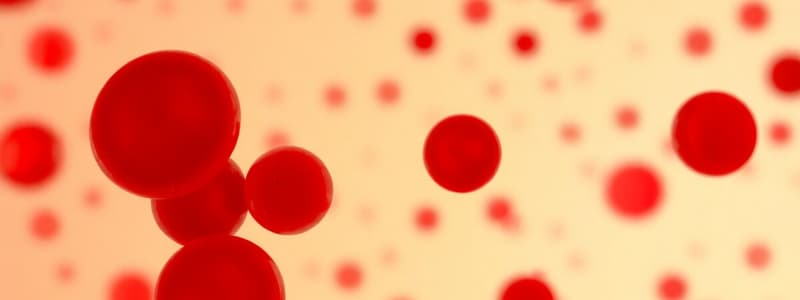Podcast
Questions and Answers
What is a consequence of red blood cells squeezing themselves into capillaries?
What is a consequence of red blood cells squeezing themselves into capillaries?
- Increased production of hemoglobin
- Death of red blood cells (correct)
- Enhanced oxygen delivery to tissues
- Reduction in bilirubin levels
What substance is produced in higher quantities as a result of dying red blood cells?
What substance is produced in higher quantities as a result of dying red blood cells?
- Cholesterol
- Glucose
- Bilirubin (correct)
- Oxygen
What could be inferred if there is much bilirubin in the bloodstream?
What could be inferred if there is much bilirubin in the bloodstream?
- Destruction of red blood cells (correct)
- Decreased absorption of iron
- Normal functioning of liver
- Excessive production of new red blood cells
Which condition might lead to the observation of red blood cells dying and increased bilirubin levels?
Which condition might lead to the observation of red blood cells dying and increased bilirubin levels?
Why is the production of bilirubin significant in the context of red blood cell death?
Why is the production of bilirubin significant in the context of red blood cell death?
What color may result from the pigment that causes discoloration?
What color may result from the pigment that causes discoloration?
What condition is indicated by the discoloration caused by the central pigment?
What condition is indicated by the discoloration caused by the central pigment?
What physiological change can occur due to the disruption caused by the central pigment?
What physiological change can occur due to the disruption caused by the central pigment?
What is a potential consequence of yellowish cavity discoloration?
What is a potential consequence of yellowish cavity discoloration?
Which of the following is NOT related to the yellowish discoloration caused by the central pigment?
Which of the following is NOT related to the yellowish discoloration caused by the central pigment?
What is the primary response of bone marrow when faced with increased demands for red blood cells (RBC)?
What is the primary response of bone marrow when faced with increased demands for red blood cells (RBC)?
What happens when there is insufficient erythropoiesis in response to RBC demands?
What happens when there is insufficient erythropoiesis in response to RBC demands?
Which of the following processes primarily contributes to the increase in red blood cell production under stress conditions?
Which of the following processes primarily contributes to the increase in red blood cell production under stress conditions?
What physiological condition might trigger hyperplasia of the bone marrow?
What physiological condition might trigger hyperplasia of the bone marrow?
What role do blood-forming organs play in relation to oxygen supply?
What role do blood-forming organs play in relation to oxygen supply?
Which factor is directly responsible for stimulating the bone marrow's hyperplastic response to increased RBC demands?
Which factor is directly responsible for stimulating the bone marrow's hyperplastic response to increased RBC demands?
What is the primary function of intrinsic factor in the body?
What is the primary function of intrinsic factor in the body?
Which cells secrete intrinsic factor?
Which cells secrete intrinsic factor?
In cases of heart failure, what compensatory mechanism is most likely to occur?
In cases of heart failure, what compensatory mechanism is most likely to occur?
What condition might cause a deficiency in red blood cell production?
What condition might cause a deficiency in red blood cell production?
What is the primary effect of antibodies on red blood cells (RBCs) in the context of polycythemia?
What is the primary effect of antibodies on red blood cells (RBCs) in the context of polycythemia?
Which term is incorrectly used to describe the condition characterized by the production of extra red blood cells?
Which term is incorrectly used to describe the condition characterized by the production of extra red blood cells?
What symptom is most closely associated with the effects of antibody activity on RBCs?
What symptom is most closely associated with the effects of antibody activity on RBCs?
In the context of erythrocytosis, what does the term 'rapid destruction' refer to?
In the context of erythrocytosis, what does the term 'rapid destruction' refer to?
What is the correct interpretation of the relationship between polycythemia and erythrocytosis?
What is the correct interpretation of the relationship between polycythemia and erythrocytosis?
Flashcards are hidden until you start studying
Study Notes
Red Blood Cells and Bilirubin Production
- Red blood cells may experience damage causing them to deform and squeeze into narrow capillaries.
- Deformation leads to increased cell death, resulting in the production of excess bilirubin.
- Elevated bilirubin levels can cause jaundice, characterized by yellowish discoloration of the skin and eyes.
Bone Marrow Response
- In response to decreased oxygen availability, such as in heart failure, remaining bone marrow undergoes hyperplasia.
- Bone marrow compensates by increasing red blood cell (RBC) production to offset reduced oxygen-carrying capacity.
Role of Intrinsic Factor
- Intrinsic Factor (IF) is secreted by parietal cells in gastric glands.
- It is essential for vitamin B12 absorption, which is crucial for RBC formation.
Polycythemia Misnomer
- Term polycythemia is often incorrectly used; the appropriate term is erythrocytosis when referring to increased red blood cell count.
Impact of Antibodies
- Certain antibodies can lead to fragility in red blood cells, contributing to their rapid destruction and subsequent anemia.
Symptoms of RBC Destruction
- Symptoms associated with RBC fragility and destruction may include fatigue, swelling, and signs of jaundice due to elevated bilirubin levels.
Studying That Suits You
Use AI to generate personalized quizzes and flashcards to suit your learning preferences.




